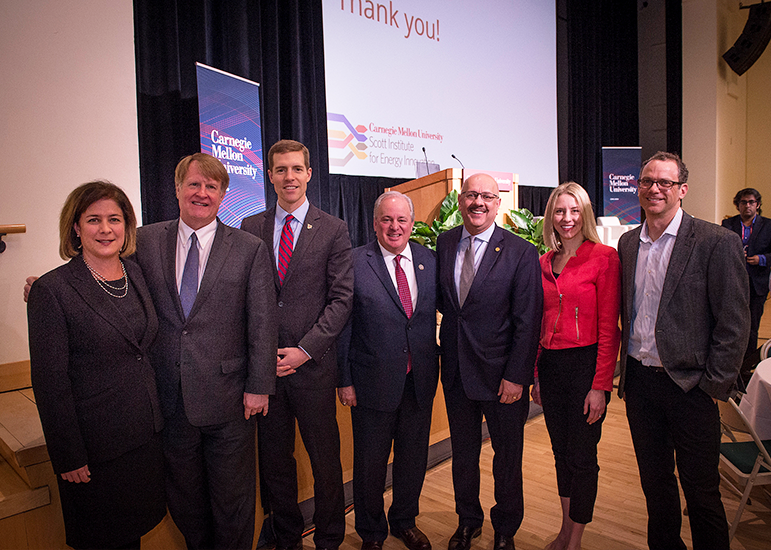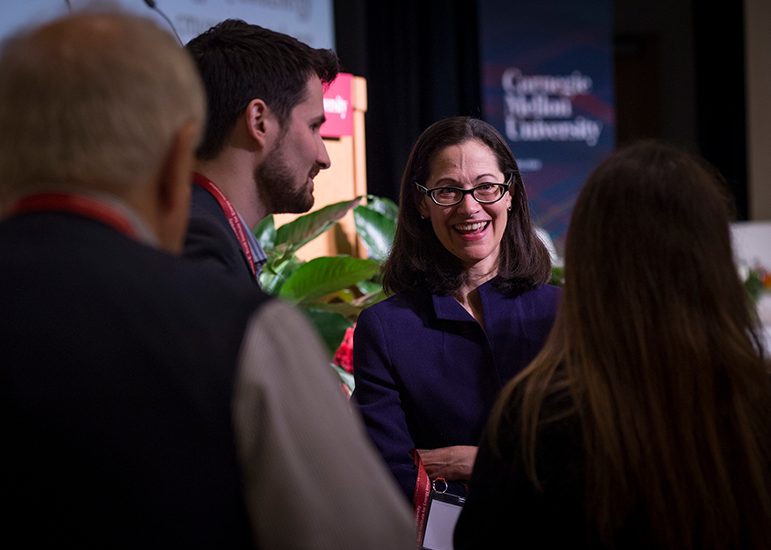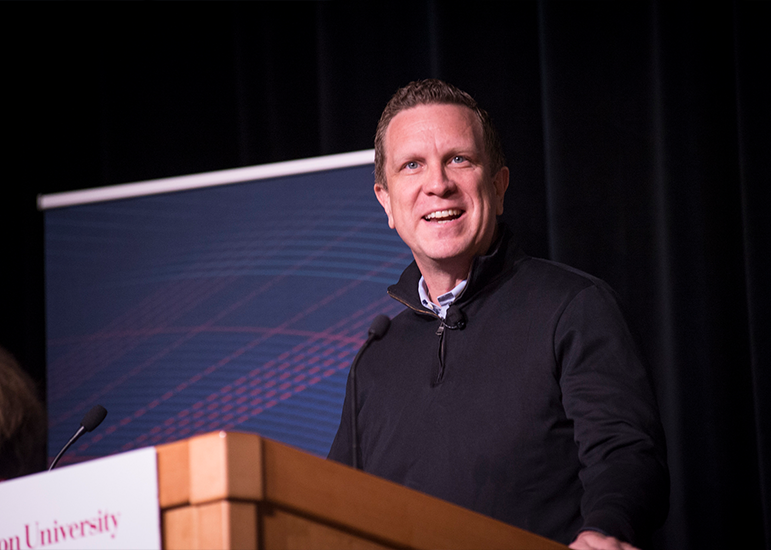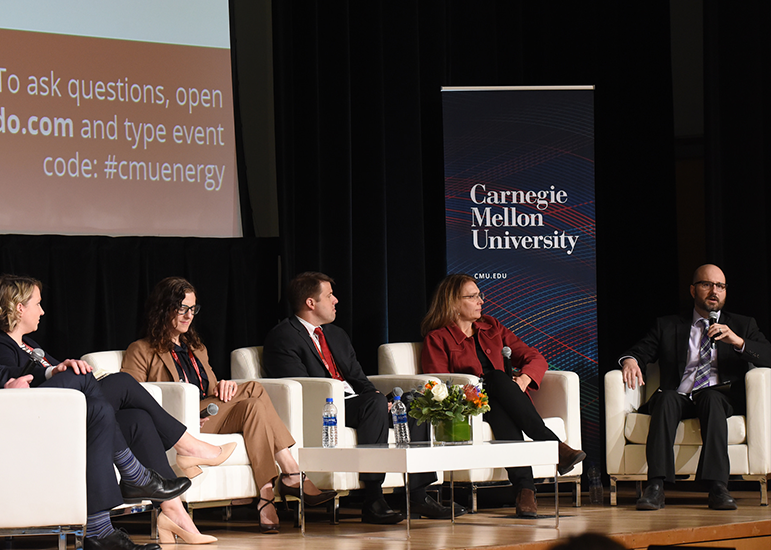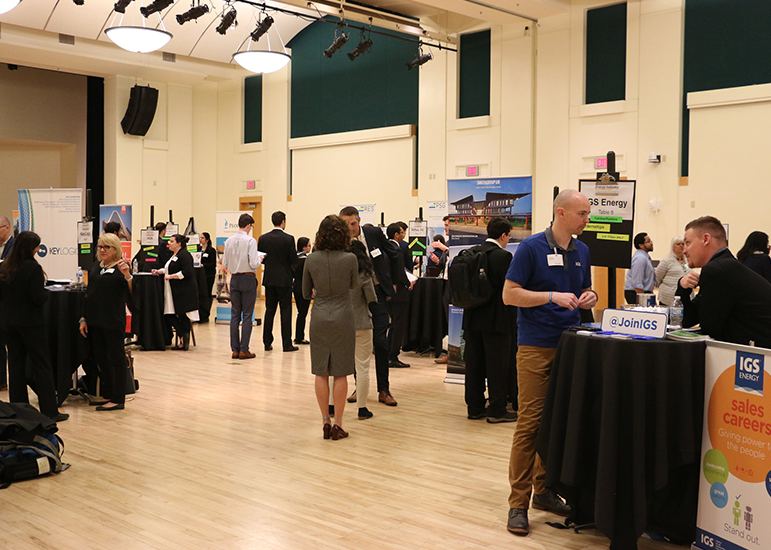Energy Week 2019: What’s next in energy innovation
From March 25 – 28, 2019, the Wilton E. Scott Institute for Energy Innovation at Carnegie Mellon University will hold CMU Energy Week 2019.
From March 25 – 28, 2019, the Wilton E. Scott Institute for Energy Innovation at Carnegie Mellon University will hold CMU Energy Week 2019. Now in its fourth year, this free symposium gathers energy experts, corporate executives, government officials, nonprofits, key influencers, students, and entrepreneurs for a facilitated dialogue on how to advance energy technologies and innovations around the world.
This year’s programming, which is open to the public, includes a distinguished forum and panel of powerhouse women who run the city’s authorities and mobility and infrastructure planning. These leaders will discuss how to create a resilient future for Pittsburgh:
- Mary Conturo, executive director of Sports & Exhibition Authority of Pittsburgh and Allegheny County
- Katharine Eagan Kelleman, chief executive officer of Port Authority of Allegheny County
- Karina Ricks, director of City of Pittsburgh Department of Mobility and Infrastructure
- Arletta Scott-Williams, executive director of Allegheny County Sanitary Authority (ALCOSAN)
“Pittsburgh’s transportation system, city planning, water treatment, and sports and convention facilities are all run by women,” says Anna J. Siefken, executive director of the Scott Institute. “We are bringing these leaders together under one roof to share their insights during CMU Energy Week 2019.”
A lineup of 10 panels featuring CMU faculty members and alumni, as well as energy experts, will tackle topics ranging from grid-scale solar to sustainability, resilience, and mobility in cities. Participating College of Engineering faculty and alumni include Larry Pileggi, head of the Department of Electrical and Computer Engineering (ECE); Jay Whitacre, director of the Scott Institute and professor of engineering and public policy (EPP) and materials science and engineering (MSE); and Paul Browning, Mitsubishi Hitachi Power Systems President and CEO.
CMU Energy Week puts CEOs in the same room as top government officials, nationally-recognized experts, and talented CMU students.
Anna Siefken, Executive Director, Wilton E. Scott Institute for Energy Innovation
One panel in particular will feature solid oxide fuel cell research conducted by Michael Whiston, a postdoctoral research associate in EPP, along with engineering professors Whitacre, Inês Azevedo, Costa Samaras, Shawn Litster, and Kate Whitefoot.
The study identifies barriers to widely commercializing solid oxide fuel cells. The researchers’ findings recommend how to meet the Department of Energy’s cost and performance targets and could inform future industry and policy-making regarding solid oxide fuel cells. After a brief presentation of these findings by Whiston, the session will open into a discussion by panelists.
Among the key energy leaders speaking at CMU Energy Week 2019 are:
- Thomas Siebel, chairman and chief executive officer of C3
- Brian Anderson, director of National Energy Technology Laboratory at U.S. Department of Energy
- Barbara J. Burger, president of Chevron Technology Ventures
- Matthew Nordan, managing director of PRIME Impact Fund
- Ken Hayes, executive director of Cleantech Open
- Mandy La Brier, director of Energy Management for the City of Chicago
- Jay Hakes, former administrator for US Energy Information Administration
- Michael O'Sullivan, senior vice president of Development for NextEra Energy Resources
Attendees can also look forward to:
- Tours of CMU’s LEED Gold certified Tepper Quad
- The inaugural CMU VentureWell Energy Hackathon where graduate students in the Pittsburgh area will propose solutions to energy challenges facing various organizations
- The third annual Energy Industry Career Fair for CMU and PITT students to meet with companies about full-time and internship opportunities
- The second annual CMU Energy + Cleantech Investor Forum and Startup Competition for entrepreneurs to pitch their companies and meet with investors
- CMU Energy Week Student Research Poster Competition
“CMU Energy Week panels and events focus on a wide range of energy sources, and put CEOs in the same room as top government officials, nationally-recognized experts, and talented students from Carnegie Mellon University,” says Siefken. “This kind of interaction is incomparable—and paramount to finding solutions for world-wide energy challenges.”

